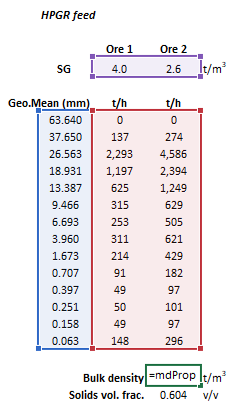Revision as of 03:53, 18 May 2023 by md>Scott.Munro
Description
This article describes the Evertsson (1999) method for estimating the bulk density of a polydisperse particle ensemble.[1]
Model theory
 This section is currently under construction. Please check back later for updates and revisions. This section is currently under construction. Please check back later for updates and revisions.
|
Excel
The Evertsson bulk density estimation may be invoked from the Excel formula bar with the following function call:
=mdProps_BulkDensity_Evertsson(MeanSize as Range, Stream as Range, SG as Range, Optional returnPackFrac as Boolean = false)
Invoking the function with no arguments will print Help text associated with the model, including a link to this page.
The input parameters and calculation results are defined below in matrix notation, along with an example image showing the selection of the same cells and arrays in the Excel interface:
- [math]\displaystyle{
\begin{align}
MeanSize & =
\begin{bmatrix}
\bar{d}_1\text{ (mm)}\\
\vdots\\
\bar{d}_{31}\text{ (mm)}\\
\end{bmatrix}\\
\\
\mathit{Stream} & =
\begin{bmatrix}
(Q_{\rm M})_{11}\text{ (t/h)} & \dots & (Q_{\rm M})_{1m}\text{ (t/h)}\\
\vdots & \ddots & \vdots\\
(Q_{\rm M})_{n1}\text{ (t/h)} & \dots & (Q_{\rm M})_{nm}\text{ (t/h)}\\
\end{bmatrix}\\
\\
\mathit{SG} & = \begin{bmatrix}
(\rho_{\rm S})_{1}\text{ (t/m}^\text{3}\text{)} & \dots & (\rho_{\rm S})_m\text{ (t/m}^\text{3}\text{)}\\
\end{bmatrix}\\
\\
\mathit{returnPackFrac} & = \big [(\text{True / False)} \big ]
\end{align} }[/math]
|
[math]\displaystyle{
\mathit{mdProps\_BulkDensity\_Evertsson} =
\begin{bmatrix}
\rho_{\rm b}\text{ (t/m}^\text{3}\text{)}^*\text{ or } \phi\text{ (v/v)}^*\\
\end{bmatrix} }[/math]
|
|
where:
- [math]\displaystyle{ n }[/math] is the number of size intervals
- [math]\displaystyle{ m }[/math] is the number of ore types
- [math]\displaystyle{ \bar{d}_i }[/math] is the geometric mean size of the internal mesh series interval that mass is retained on (mm)
- [math]\displaystyle{ Q_{\rm M} }[/math] is the mass flow rate of particles in the stream (t/h)
- [math]\displaystyle{ \rho_{\rm S} }[/math] is the Specific Gravity or density of solids (- or t/m3)
- [math]\displaystyle{ \mathit{returnPackFrac} }[/math] indicates whether to return the packing fraction (solids volume fraction) of particles in the stream (v/v). Default is to return the bulk density (t/m3)
- [math]\displaystyle{ \rho_{\rm B} }[/math] is the bulk density of particles in the stream (t/m3)
- [math]\displaystyle{ \phi }[/math] is the solids volume fraction of particles in the stream (v/v)
- the superscript [math]\displaystyle{ ^* }[/math] indicates an optionally-returned value
|
|
 Figure 1. Example showing the selection of the MeanSize (blue frame), Stream (red frame), SG (purple frame), and Results (green frame) arrays in Excel. The parameter [math]\displaystyle{ \mathit{returnPackFrac}=\text{False} }[/math] in this example.
|
References
- ↑ Evertsson, C.M., 1999. Size reduction in cone crushers. In Minerals Engineering Conference '99, Falmouth, England, 22-24 September 1999.
